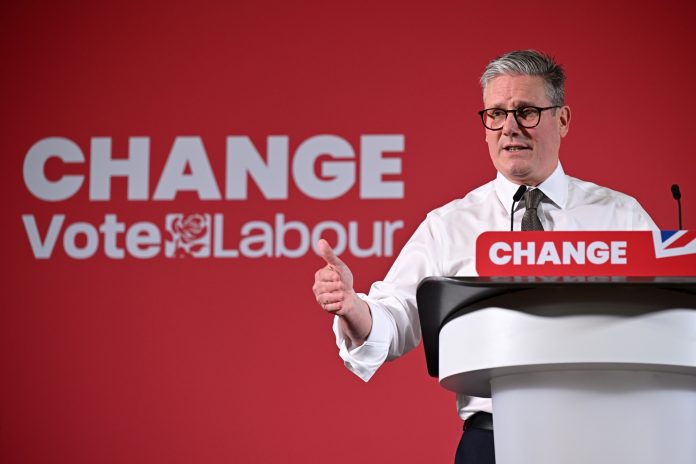Since 2016, British Conservatives have consistently compared the EU to the Soviet Union and Nazi Germany, called the remarks of a senior EU official “bizarre and stupid” and threatened to break international law by rewriting the Brexit deal unilaterally. So the new Labour government won’t have to work hard to set a different tone, The Guardian reports.
While the EU is ready to deepen ties with a future Labour government, widely believed to come to power after July 4, it will not offer radical concessions to Keir Starmer. EU sources, who have already welcomed the warming of relations under Rishi Sunak, are cautious about the changing political weather on the other side of the Channel.
Officials see the potential for improved relations with the UK under Starmer’s government, but say any agreements – whether to facilitate trade in fresh produce, student exchanges or youth mobility – will require the UK to accept “rules and responsibilities.” Pointing out that closer ties have been on offer to successive Conservative governments, one EU diplomat said:
“If the UK is looking for a more positive relationship, they will be pushing an open door at this end. There is potentially a lot available in terms of closer relationships … But that has been available at any time, and of course there are responsibilities and rules attached to it from the UK side.”
German Greens look for co-operation
Terry Reintke, a German Green MEP, who is her group’s joint leading candidate in the European elections, said she was hopeful any change in government would bring a more positive relationship. She said in an interview in her Brussels office, where hanging on the wall is an EU-UK scarf from the emotional last parliamentary session attended by British MEPs in 2020:
“I think that there are so many areas where we have to work together more closely. One very obvious example is foreign and security policy. With the war in Ukraine, it has just become more obvious that we have to work closely together as allies.”
The Green MEP, who studied at Edinburgh University on an Erasmus exchange programme, said she hoped the election would lead to less polarisation in the UK. She said recent Tory governments had shown “wanton hostility towards the EU, [which] is really unworthy of the old Conservative party.”
EU-UK relations
Brussels insiders believe EU-UK relations have already improved significantly under Sunak after the prime minister signed the Windsor framework, ending years of wrangling over the Northern Ireland protocol. The diplomat said:
“There is often a sense in the UK, from what we see, that the EU offered a worse deal to the Tories because the Tories are so negative. I just don’t think that that’s reality. It had everything to do with the positions taken by the UK government and nothing to do with politics of the UK government.”
However, while the EU struggles with internal divisions over support for Ukraine, tensions with China and the upcoming EU elections, the UK is far from a priority. A second EU diplomat warned against overestimating the importance of British politics:
“There isn’t that sense of “yes, here comes a Labour government”, because over the past year and a half we have worked quite nicely with the last Conservative government. And the EU-UK relationship isn’t taking up as much of our mental space as it was a few years ago. If a Labour government comes with ideas and credible proposals – and I can’t underscore the word “credible” enough – we would be willing to discuss and entertain those conversations.”
Labour wanted a “new geopolitical partnership” with the EU
Under Starmer, Labour ruled out joining the single market and customs union, much less the entire EU. Instead, the party has said it wants to lower trade barriers and sign a security agreement between the EU and the UK. Shadow foreign secretary David Lammy said last month that Labour wanted a “new geopolitical partnership” with the EU. Lammy wrote in Foreign Affairs:
“The centrepiece of this relationship should be a security pact that drives closer coordination across a wide variety of military, economic, climate, health, cyber, and energy security issues, and that complements both parties’ unshakable commitment to NATO.”
If successful, the Starmer government will soon be able to showcase its new approach when it hosts the European Policy Community summit at Blenheim Palace on July 18, which will be attended by more than 40 countries. A third diplomat said:
“We notice some attempts in the UK to get closer to the EU and to be a stronger geopolitical actor. [The] European Political Community summit will be a major stage to prove that the UK wants to make a difference.”
Youth Mobility programme
Despite the goodwill, Labour may soon find itself in difficult circumstances, as evidenced by the European Commission’s recent surprise proposal on youth mobility. Labour and the government were quick to rule out a post-Brexit deal that would allow people aged 18-30 to live, study and work on either side of the Channel for four years.
The commission’s proposal would have been difficult for any cash-strapped UK government under severe constraints on public spending. Under the Youth Mobility programme, the commission said EU students should pay the same tuition fees at British universities as their UK classmates, and waive the NHS surcharge for all participants in the programme. Both measures cost money, demonstrating that improving ties with the EU involves trade-offs for any government – Conservative or Labour. The first EU diplomat said:
“Great if the Starmer government comes in and is willing and able to work closer with the EU. But being willing and able means they have to make the compromises that would be necessary in order for the positive closer relationship and be able to sell that back home. So, we will wait and see.”
